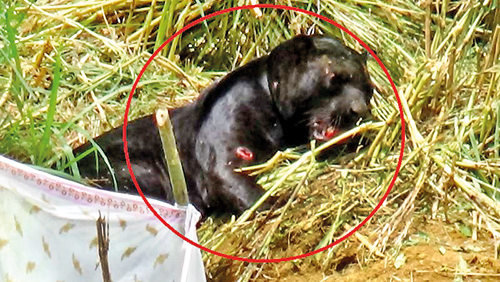Let’s save our big cats for future generations

Tragic death of a black leopard caught in a snare
The Leopard – Panthera pardus kotiya, the largest cat species in the country, a top predator, categorised as Endangered by the IUCN was widespread across the island 20- 30 years back. Now limited to patches of forests in parts of the country, the leopard population is fast dwindling due to the negligence of all who are supposed to protect it but is still advertised as a visitor attraction to wildlife parks
Why do leopards venture into villages and tea plantations? It is the loss of habitat over the years due to fragmentation of the forest isolated among tea plantations. Leopards begin to explore other areas for two reasons: looking for alternative sources of food that cannot be found in the reduced patches of jungle being made smaller and smaller by expansion of tea plantations and felling of forests as well as cluster villages expanding on to the borders of jungles. With such expansion, there is plenty of prey close to their habitat with domestic animals such as goats, dogs, cattle etc.
If leopards are found in your region or estate do not touch them, or go near them, alert all workers to keep away from this area. Sri Lankans are famous for gathering at places as observers. Cubs should not be touched or taken away. Usually females may move den sites and transport these cubs one by one and a spot where they are seen may be a stopover as the mother leopard is moving the cubs. Be watchful because the mother may be nearby, and can be extremely dangerous and protective. Move away and leave them alone, as the mother will take them to a safer place away from danger.
If the cubs are not taken away by the mother in a day, the Wildlife / Police Department should be alerted by the Plantation Management and all workers should be warned not to get near or handle any cubs found in the estate. Workers should be trained to inform supervisors and management ASAP.
The same rules apply to other wild cat species, now very rare and becoming almost extinct such as the Fishing Cat, Rusty Spotted Cat etc. If you spot them, keep your distance and do not disturb them, the cats will move away naturally. It is our responsibility to save then for future generations
Action must be taken by Wild Life / Forest Department officials and Police against those setting snares/traps. These cause immense suffering and trauma to the animal. The latest death of a black leopard was caused by trauma/negligence.
As per the current iteration of the Flora and Fauna Protection Ordinance (FFPO), amended in 2009, the Sri Lanka Leopard is a “Strictly Protected Species” under Schedule II in the “Mammals and Reptiles” Section. As per Section 30, Subsection II, “Any person who commits any act prohibited under this section, against ANY Mammal or Reptile specified in Schedule II, of this Ordinance” i.e. kills, wounds or injures “shall be guilty of an offence, be liable to a fine not less that Rs. 30,000 not more than Rs. 100,000 or to imprisonment of either description for a term not less than two years / not exceeding five years or to both such fine and imprisonment.
Under Section 30, Subsection I, Paragraph C “Any person who in any area outside a National Reserve, Strict Nature Reserve, National Park, Nature Reserve, Protected Area, Buffer Zone, Wildlife Corridor or a Wildlife Sanctuary, uses any boat or any time, snare, net, spear, trap, gun, rod, line or hook with any accessory or bait, or explosives of any description, or other instrument for the purposes of killing, wounding, injuring or taking any such mammal or reptile, shall on conviction be liable to a fine not less than 20,000 LKR and not exceeding 50,000 LKR or to imprisonment of either description for a term not less than two years and not exceeding five years or to both such fine and imprisonment -(Flora and Fauna Protection Ordinance (2009))
Immediate action should be taken by staff and communities connected to the estate to eradicate snares. Regular sweeps and checks of the estate to ensure snares/traps are found and destroyed is the responsibility of the Plantation Management. Plantation companies as responsible corporate entities must eliminate snares/traps completely in their plantations. This will not happen till Police representing the people of the country prosecute the Plantation Company for allowing a wild animal to be injured or murdered in their property. Currently it takes three years or more to hear a case with many postponed dates to conclusion.
What action should you take when an animal is caught in a snare/trap? Firstly prevent onlookers going near it, keep a wide distance, especially don’t take children to the scene. Do not hit or harm the animal or make any noise. Alert the estate supervisor/superintendent. Inform Wildlife Department / Police immediately. Don’t spread the news, keep distance and don’t disturb the animal. When the Wildlife Department officials are rescuing the animal, stay away, keeping at least 300 metres distance and don’t become a hindrance to them.
Let’s all take responsibility to save these voiceless animals for future generations.


